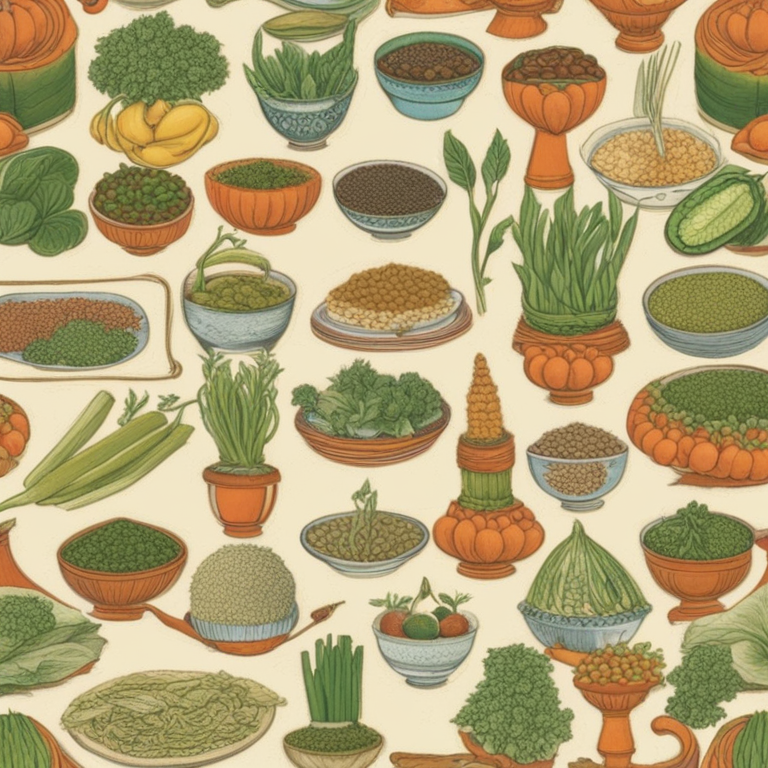Introduction:
Plant-based eating has been on the rise globally as people become more aware of the health and environmental benefits of adopting a vegetarian lifestyle. In India, vegetarianism is not just a dietary choice but a way of life deeply rooted in cultural and religious beliefs. From delicious street food to elaborate festive feasts, plant-based eating plays a significant role in India’s rich culinary tradition. In this blog post, we will explore the rise of plant-based eating in India and how its vegetarian lifestyle has become a symbol of its cultural heritage.
Subheadings:
1. A Brief History of Vegetarianism in India
2. The Health Benefits of a Plant-Based Diet
3. The Environmental Impact of Plant-Based Eating
4. Plant-Based Eating in Indian Cuisine
5. Tips for Transitioning to a Plant-Based Diet in India
6. Conclusion: Embracing India’s Vegetarian Lifestyle
1. A Brief History of Vegetarianism in India:
Vegetarianism has a long history in India dating back to ancient times. The practice of ahimsa, or non-violence towards all living beings, is a central tenet of Hinduism, Buddhism, and Jainism, the three major religions in India. This principle advocates for compassion and respect for all forms of life, leading many Indians to adopt a vegetarian diet out of ethical considerations. Over the centuries, vegetarianism has become deeply ingrained in Indian culture, with vegetarian dishes being a staple in most households.
2. The Health Benefits of a Plant-Based Diet:
A plant-based diet has been linked to numerous health benefits, including lower risks of heart disease, diabetes, and certain types of cancer. In India, where rates of chronic diseases are on the rise, many people are turning to plant-based eating as a way to improve their health and well-being. Traditional Indian ingredients such as lentils, chickpeas, and vegetables are rich in nutrients and antioxidants, making them an excellent choice for a balanced vegetarian diet.
3. The Environmental Impact of Plant-Based Eating:
The environmental impact of animal agriculture is a growing concern globally, with livestock production contributing to deforestation, water pollution, and greenhouse gas emissions. By choosing plant-based foods over animal products, individuals can reduce their carbon footprint and help protect the planet for future generations. In India, where agriculture is a major industry, the shift towards plant-based eating can have a significant impact on sustainability and conservation efforts.
4. Plant-Based Eating in Indian Cuisine:
Indian cuisine is known for its vibrant flavors and diverse range of vegetarian dishes. From fragrant curries to spicy street food, there is no shortage of plant-based options to choose from. Popular dishes such as dal (lentil stew), chana masala (spiced chickpeas), and palak paneer (spinach with cottage cheese) showcase the creative use of vegetables, legumes, and spices in Indian cooking. Vegetarianism is not seen as a limitation in Indian cuisine but rather a celebration of the bountiful produce available year-round.
5. Tips for Transitioning to a Plant-Based Diet in India:
If you are considering adopting a plant-based diet in India, here are some tips to help you make the transition smoothly:
– Start by incorporating more plant-based meals into your diet gradually, such as vegetable stir-fries, lentil soups, and fresh salads.
– Experiment with different spices and herbs to add flavor to your dishes, from cumin and coriander to turmeric and garam masala.
– Explore traditional Indian dishes that are naturally vegetarian, such as dosas, idlis, and thalis, to discover new flavors and textures.
– Stock up on pantry essentials like lentils, rice, spices, and nuts to make cooking at home easier and more enjoyable.
– Don’t be afraid to try new ingredients and cooking techniques, whether it’s fermenting dosa batter or pressure-cooking chickpeas, to expand your culinary repertoire.
6. Conclusion: Embracing India’s Vegetarian Lifestyle:
As the world becomes more conscious of the impact of our food choices on our health and the planet, the rise of plant-based eating has gained momentum in India and beyond. With a rich culinary tradition and a deep-rooted vegetarian lifestyle, India is well-positioned to lead the way in promoting sustainable and compassionate eating practices. By embracing the diversity and flavors of plant-based foods, we can not only nourish our bodies but also respect the interconnectedness of all life on Earth. Let’s celebrate India’s vegetarian heritage and continue to explore the delicious possibilities of plant-based eating together.
👉 [Best Deals on Amazon!](https://amzn.to/abcd) | [Flipkart](https://fkrt.it/xyz123)
